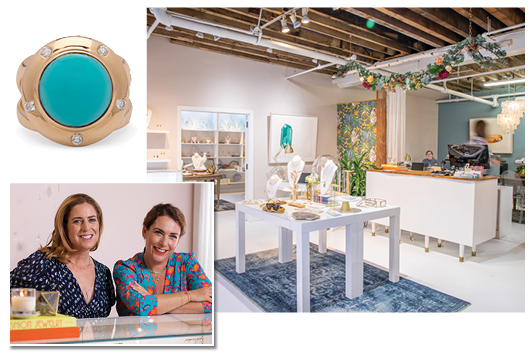
Megan and Moria Flynn have found themselves experiencing an unwelcome sense of déjà vu. The two sisters opened M. Flynn in Boston, Massachusetts, in 2008 just as the recession hit. Although they weathered that crisis, Covid-19 poses a different set of challenges.
“We’re going back to appointment-only and focusing on our online efforts,” says Moria.
“It’s just the two of us for now,” adds Megan. “We really can’t go through the heartache again of shutting down and furloughing our staff.” Given the strict rules that Massachusetts has imposed, she says, “we are not going to invest in our in-store experience until we are sure what is happening.”
Even with things in flux, one constant will be their product offering: fine and costume jewelry that gives women options. “We were really adamant about having all types of jewelry, because we feel that even for ourselves, not every occasion is a diamond-ring occasion. Sometimes, you just want a fun pair of earrings,” explains Moria.
“It seemed shortsighted to us to just have a fine jewelry store or a costume jewelry store,” Megan agrees. “Women layer all types of jewelry. The story we tell is very relatable. You can mix high and low. Women have been doing that in clothing for years.”
Driven by women
Self-purchasing women are at the core of their business. “Everything stems from that,” says Megan, noting that their second category of customers is men who have been directed to the store by women. Bridal is the third category, and it’s also female-driven.
Having an instinctive understanding of female clients’ tastes has been an advantage, according to Moria. “In many ways, this is a male-dominated industry. I think a lot of times, people trust us to work with them because we are women.”
Yet she says men also appreciate their input. Men who are buying gifts often come with a picture, she notes. “I can get a read pretty easily. I look to see if [the women in the picture] are petite or tall. If they are wearing jewelry, I look for clues to their jewelry personality. Are they classic or funky?”
Megan identifies “unique designs” as the sisters’ top criterion for choosing designers. But they also look for brands that fill a niche and complement their own designs. As examples, she cites Foundrae for its beautiful enamel pieces, which they cannot create, and the “slightly more modern” diamond designs of Jade Trau and Melissa Kaye. Brent Neale adds a bit of whimsy and fun, and Retrouvaí features stones that the Flynns generally do not incorporate in their own work.
Finding ways to reach out
Covid-19 has upended traditional selling. “Online is the way to go,” asserts Megan. “Brick and mortar always allowed customers to touch and feel. We want to replicate that as much as possible.”
They’ve been turning to various tools to do so. “We have been in continual contact with customers via multiple channels, from text and calls to social media and Zoom,” Megan elaborates. “We’ve texted nonstop about everything from a several-thousand-dollar necklace to a $200 bracelet. We’re exploring text-to-buy through sending the invoice via text.”
Even though shutting the store was devastating, both women consider themselves fortunate. “One thing we have learned is that we have the advantage of very easily adapting our business,” says Moria. “Megan and I realized that we have to change with the times, and having the financial resources allowed us to come up with a timely response.”
“I’m not going to lie. We shed a lot of tears,” admits Megan. “But then we started pivoting. I would say our future is a different kind of retail experience that starts online and makes people feel that they are in touch with us — that there is a real person behind that text or email. To enhance that sense, we take pictures of the ring on our finger or a bracelet on our wrist so the customer can see the jewelry being worn, like in the store.”
Navigating the line between safety and personal attention can be challenging. “Comfort is taking on a new meaning post-pandemic. We’re looking to create enhanced high-touch customer service,” says Megan, while Moria adds that “we want to leverage chat commerce as a way to obviate the cold and impersonal feel of a website.” But both sisters concur that their post-Covid-19 strategy comes down to “whatever it takes.”
Images: M.FlynnArticle from the Rapaport Magazine - July 2020. To subscribe click here.